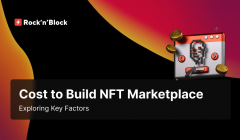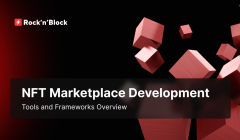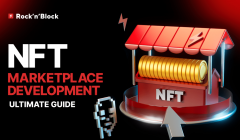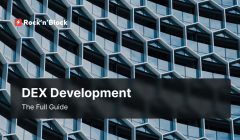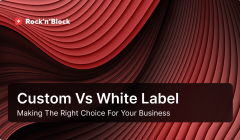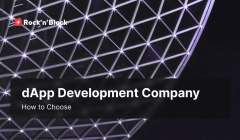NFT Marketplace Development for Metaverse
03 May 2024In recent years, the digital landscape has undergone a remarkable transformation with the emergence of the Metaverse and Non-Fungible Tokens (NFTs). These two trends have intersected to create a new realm of opportunity for developers, creators, investors, and technology enthusiasts alike. This article explores NFT marketplace development for metaverse essentials, defining its key components and discussing its significance in shaping the future of digital commerce.
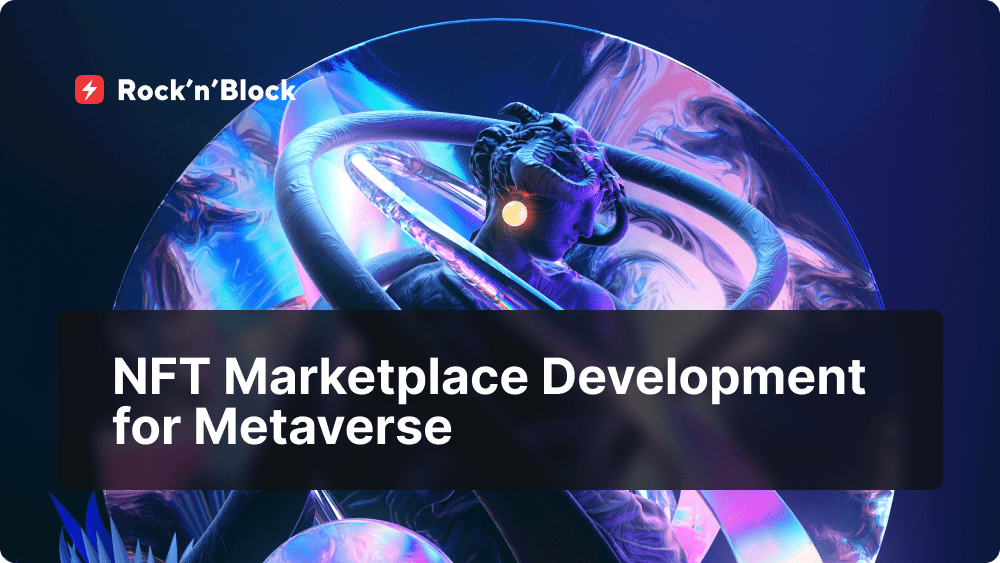
Table of Contents:
-
Introduction to Metaverse NFT Marketplace Development
-
Key Components of NFT Marketplaces in Metaverse
-
Features of NFT Marketplace Development for Metaverse
-
Types of NFT Marketplaces for Metaverse
-
How to Build NFT Marketplace for Metaverse
-
Conclusion
Introduction to Metaverse NFT Marketplace Development
Defining the Metaverse
A Metaverse refers to a digital world built on blockchain technology that serves as an alternative or replica of the physical world. It provides immersive virtual environments that replicate elements of the real world, such as social interactions, currency, trade, economics, and property ownership. It provides a digital universe where users can interact with each other and digital objects in real time. A metaverse blurs the boundaries between the physical and digital worlds.
According to Statista, the Metaverse market is projected to experience substantial growth, reaching a value of US$74.4 billion in 2024 and expanding further to an estimated US$507.8 billion by 2030, with an annual growth rate of 37.73%. By 2030, the number of users in the Metaverse market is expected to soar to 2,633.0 million, with user penetration predicted to increase from 14.6% in 2024 to 39.7% in 2030. The Metaverse market exhibits significant potential worldwide, with countries such as the United States, China, and Japan leading in technological advancements and user adoption.
Understanding NFT Marketplaces
NFTs, or Non-Fungible Tokens, are digital assets that represent ownership of a specific item or piece of content. Unlike cryptocurrencies such as Bitcoin or Ethereum, which are fungible and can be exchanged, NFTs are unique.
NFT marketplaces are decentralized platforms for trading unique digital assets. They allow creators to showcase and monetize their work, while collectors and enthusiasts can discover and acquire rare and valuable digital collectibles. As the demand for NFTs continues to grow, entrepreneurs and developers are focusing on NFT marketplace development to capitalize on this market.
The Role of Metaverse NFT Marketplace Development
NFT marketplace development is essential for the future of digital commerce in a Metaverse. Developers build user-friendly platforms for buying and selling NFTs, enabling creators to seamlessly monetize their digital creations and reach a global audience. These marketplaces also promote the democratization of ownership, allowing individuals from diverse social backgrounds to participate in the digital economy.
Metaverse NFT marketplace development represents a new way of perceiving and interacting with digital assets. By using blockchain technology and a Metaverse, these marketplaces change digital commerce, empower creators, and redefine ownership in the digital age. It is important to acknowledge the opportunities ahead and work towards building a more inclusive and innovative digital future
Key Components of NFT Marketplaces in Metaverse
Metaverse NFT marketplace development requires a robust infrastructure and a range of essential components to facilitate the trading of digital assets within virtual environments. In this section, we outline the key components that are fundamental to the operation and success of these innovative platforms.
Technology Stack
The foundation of any NFT marketplace development for metaverse is the underlying virtual environment where users interact with digital assets. This infrastructure includes the underlying technology stack, such as blockchain networks and decentralized storage solutions. Developers must establish a scalable and secure infrastructure to support the growing demand for digital assets within a Metaverse.
Creator Tools and Support
NFT marketplace development provides creators with a suite of tools and services to help them create, showcase and monetize their digital creations effectively. These tools may include customizable storefronts and analytics dashboards. By empowering creators with the tools they need to succeed, these marketplaces foster a vibrant ecosystem of digital content creation and distribution.
Browsing and Discovery Tools
In NFT marketplace development for metaverse, browsing and discovery are crucial components that enable users to explore and find NFTs of interest. This includes implementing intuitive search and filtering mechanisms, categorizing NFTs by type, rarity, theme, or other characteristics, and providing personalized recommendations based on user preferences and browsing history. Additionally, integrating features like trending NFTs, curated collections, and artist spotlights enhances the discovery experience, fostering engagement and discovery within the vast universe of digital assets.
Buy, Sell, Auction Functionality
The buy, sell, auction functionality forms the backbone of an NFT marketplace, allowing users to trade NFTs seamlessly. This involves implementing secure payment gateways and cryptocurrency wallets connection to facilitate transactions, enabling users to purchase NFTs using various payment methods or cryptocurrencies. Sellers can list their NFTs for sale or auction, setting parameters such as starting bid, reserve price, and duration. Smart contract integration ensures transparency and trust in the auction process, with automatic execution of bids and settlements.
Features of NFT Marketplace Development for Metaverse
NFT marketplace development for metaverse is unique and transformative due to its innovative features and functionalities that distinguish it from traditional online marketplaces. This section explores some of the key characteristics that make these platforms stand out in the digital landscape.
-
Virtual Real Estate Trading: a metaverse NFT marketplace development feature where users can trade digital parcels of virtual land, represented as non-fungible tokens (NFTs), enabling individuals to establish ownership and create unique virtual properties within the metaverse landscape.
-
Avatar Customization Marketplace: a dedicated section of an NFT marketplace development for a metaverse where users can personalize their digital avatars by acquiring and trading NFT-based assets such as clothing, accessories, animations, and unique appearance traits, allowing for individualized expression and identity within virtual environments.
-
Virtual Goods and Collectibles: a segment in NFT marketplace development for the metaverse dedicated to the exchange of non-fungible tokens representing digital items, collectibles, and artifacts specific to virtual worlds, enabling users to acquire, showcase, and trade unique virtual assets ranging from in-game items to digital artworks.
-
Integration with Virtual Environments: a metaverse NFT marketplace development feature that facilitates seamless connectivity and interaction between the marketplace platform and various virtual worlds or platforms within the metaverse ecosystem, allowing for the exchange of assets, data, and experiences across interconnected virtual environments.
-
Event Tickets and Access Passes: functionality within a metaverse NFT marketplace development that enables users to purchase, exchange, and redeem non-fungible tokens (NFTs) representing tickets or access passes to virtual events, experiences, performances, and gatherings hosted within the metaverse, granting exclusive entry and participation privileges.
-
Virtual Reality (VR) Integration: a feature, incorporated into an NFT marketplace development for the metaverse, enables users to access and interact with the marketplace and NFT assets through immersive virtual reality (VR) environments, providing a more immersive and engaging experience for users within virtual worlds.
-
Creator Tools and Monetization: a suite of tools and functionalities offered within an NFT marketplace development to empower creators to mint, list, and monetize their digital creations as non-fungible tokens (NFTs), providing avenues for artists, developers, and content creators to showcase their work and generate revenue within the metaverse ecosystem.
-
Dynamic Pricing and Auctions: in NFT marketplace development for the metaverse, this feature enables flexible pricing strategies and auction mechanisms for non-fungible tokens (NFTs), allowing for real-time price adjustments, bidding processes, and market-driven valuation of virtual assets within the dynamic metaverse economy.
-
Social Features and Networking: refers to a suite of interactive features and networking functionalities embedded within an NFT marketplace development for the metaverse to facilitate social engagement, communication, and collaboration among users, including user profiles, messaging systems, groups, and community hubs within virtual environments.
-
Loyalty and Rewards Programs: incentive programs integrated into an NFT marketplace development for the metaverse to reward user engagement, participation, and contribution within the platform, offering perks, benefits, and exclusive rewards to loyal users and active community members within the metaverse ecosystem.
Explore NFT Launchpad Development Key Trends and Insights, and its role in the creation and launch of NFTs.
Types of NFT Marketplaces for Metaverse
NFT marketplaces for metaverse vary in focus, functionality, and the types of digital assets they support. Here are some common types:
Art Metaverse Marketplaces
Several metaverse marketplaces are already established for trading NFT art. These platforms also offer users interactive experiences, allowing them to explore digital artworks, visit virtual galleries, exhibitions and auctions.
Gaming and Virtual World Marketplaces
Focused on virtual assets within gaming environments and virtual worlds, these marketplaces allow players to buy, sell, and collect in-game items, characters, land, and etc.
Virtual Fashion and Wearables Marketplaces
Catering to avatar customization within virtual environments, these platforms offer digital fashion items, wearables, and accessories. Users can personalize their avatars with unique virtual clothing and accessories.
Real Estate and Virtual Land Marketplaces
Real estate NFT marketplace development specializes in virtual real estate, allowing users to trade virtual land parcels within a Metaverse. Creators can design virtual experiences on their land, ranging from art installations to virtual businesses.
Music and Entertainment Marketplaces
These platforms focus on digital assets related to music, including NFTs representing music rights, albums, and concert experiences. Creators can tokenize their music and offer exclusive experiences to fans, such as Metaverse concerts.
E-commerce NFT Marketplaces in Metaverse
E-commerce type of metaverse NFT marketplace development combines the functionalities of traditional e-commerce platforms with the unique features of NFTs and virtual environments. These marketplaces enable users to trade digital assets while incorporating familiar e-commerce features such as product listings, shopping carts, and checkout processes. Users can browse through a wide range of digital products, make purchases using various payment methods, and manage their digital asset portfolios within the virtual environment.
How to Build NFT Marketplace for Metaverse
The step-by-step process NFT marketplace development for metaverse involves several key stages, each essential for creating a robust and functional platform. Here's a concise overview of the process:
1. Market Research and Planning
Conduct thorough market research to understand the target audience, competitors, and emerging trends in a Metaverse and NFT space. Define the goals and objectives of the NFT marketplace and develop a comprehensive business plan outlining the platform's features, functionality, and monetization strategy.
2. Choosing the Technology Stack
Select the right technology stack, including choosing the right blockchain for NFT platform development. Considerations include scalability, security, and interoperability.
Discover our Top 5 Blockchains for NFT Marketplace Development!
Creating a successful NFT marketplace can be challenging due to the intricate technologies involved. To navigate this complexity with ease and efficiency, it is recommended to use the expertise of an NFT development company. These companies have specialized knowledge and skills to provide invaluable support from conception to execution, ensuring the successful creation of a thriving NFT marketplace.
Explore The Role of NFT Development Company and How to Hire NFT Marketplace Developers in 4 Steps!
3. Development
Smart Contract Development
NFT smart contract development is essential for creating, transferring, and, if necessary, destroying unique digital assets. This step requires coding expertise and a profound understanding of blockchain-specific languages.
Backend Development
Backend development in an NFT marketplace involves creating secure user authentication systems, integrating payment processing solutions, establishing robust database management for user and transaction data, implementing security measures to prevent breaches, optimizing scalability and performance, and integrating with external APIs.
Frontend Development
Frontend development employs creation of an intuitive, visually appealing, and responsive interface that executes frontend logic based on the business and technical requirements. Prioritize interfaces that seamlessly integrate with the immersive nature of a Metaverse, offering intuitive navigation, interactive elements, and visually engaging displays of NFTs. Design considerations can include incorporating virtual reality (VR) and augmented reality (AR) technologies to enhance the browsing and purchasing experience, allowing users to interact with NFTs in a lifelike manner.
4. Testing and Quality Assurance
Conduct rigorous testing and security audits of the marketplace to identify and fix bugs, errors, and security vulnerabilities. Implement security measures such as encryption, authentication, and access controls to protect user data and transactions.
5. Deployment and Launch
The final step in a Metaverse NFT marketplace development process is deploying a platform to a mainnet. Monitor the marketplace's performance and stability during the launch phase, addressing any issues or bottlenecks that may arise.
6. Maintenance and Updates
Regularly monitor and maintain the NFT marketplace to ensure ongoing performance, security, and scalability. Release updates and new features based on user feedback, emerging trends, and technological advancements in a Metaverse and NFT space.
Learn more about the development process and developer’s insights in our comprehensive articles:
Conclusion
NFT marketplace development for metaverse is a significant milestone in the evolution of digital commerce and virtual interactions. These platforms will continue to innovate and be adopted, transforming how we interact with digital content and unlocking new possibilities for creativity, expression, and community engagement within a Metaverse. Metaverse NFT marketplaces have great potential to shape the digital landscape for years to come.
Don't hesitate to seize this opportunity and leverage NFT marketplace development services right now!
Contact us today, and let us guide you in harnessing the power of this transformative technology for your business.
We ❤️ Development
Follow us on social media to receive the hottest blockchain development updates
